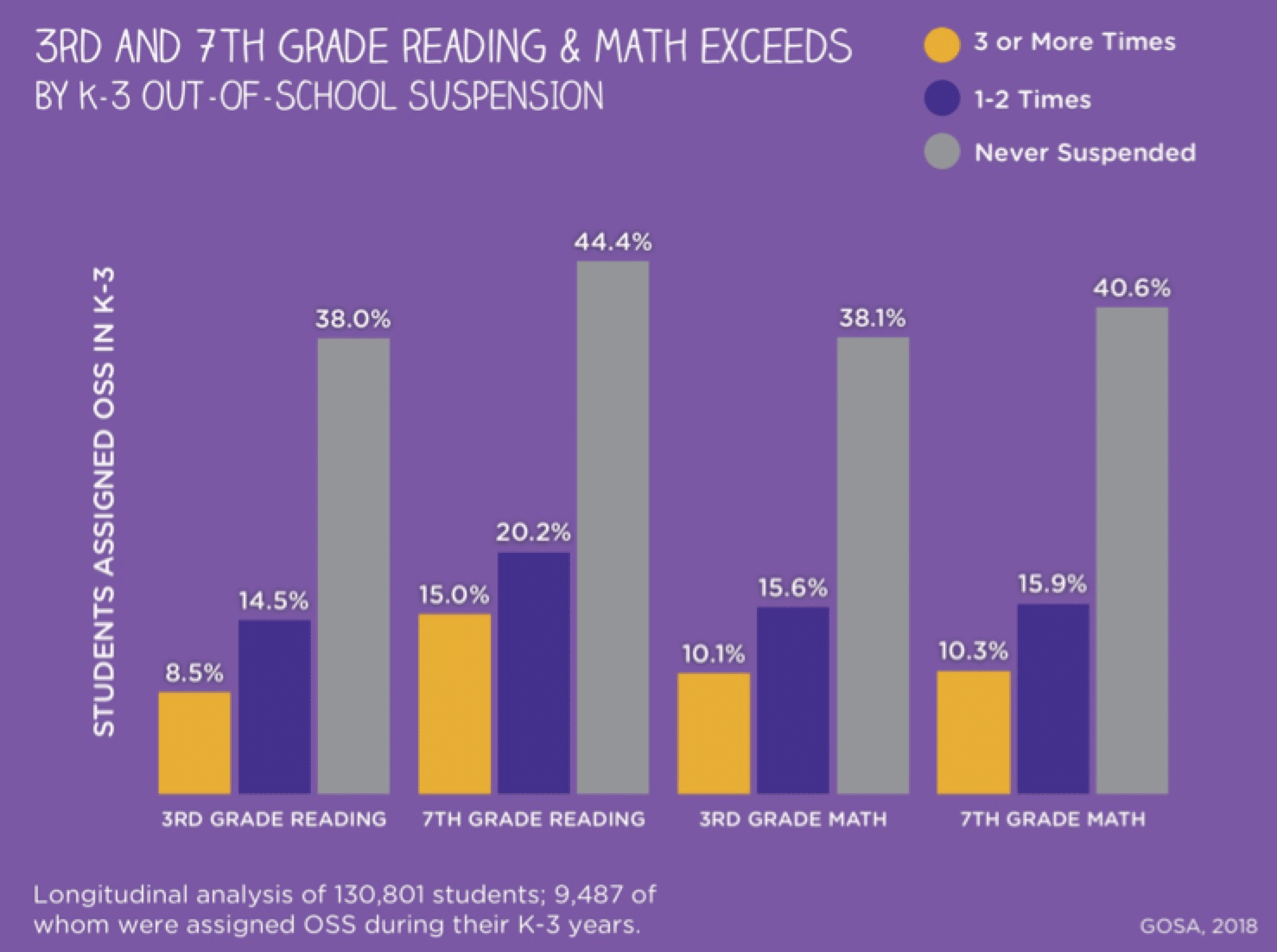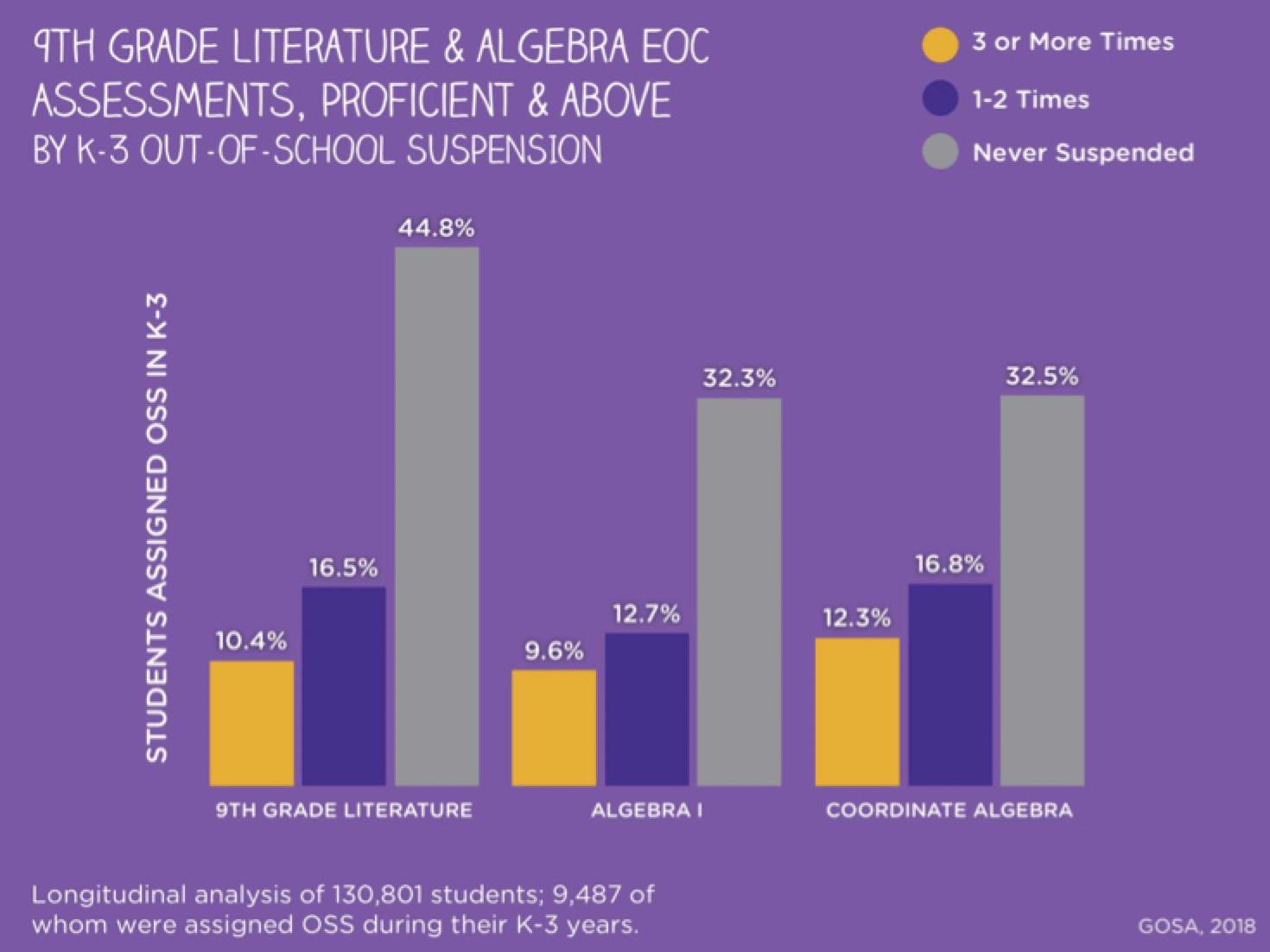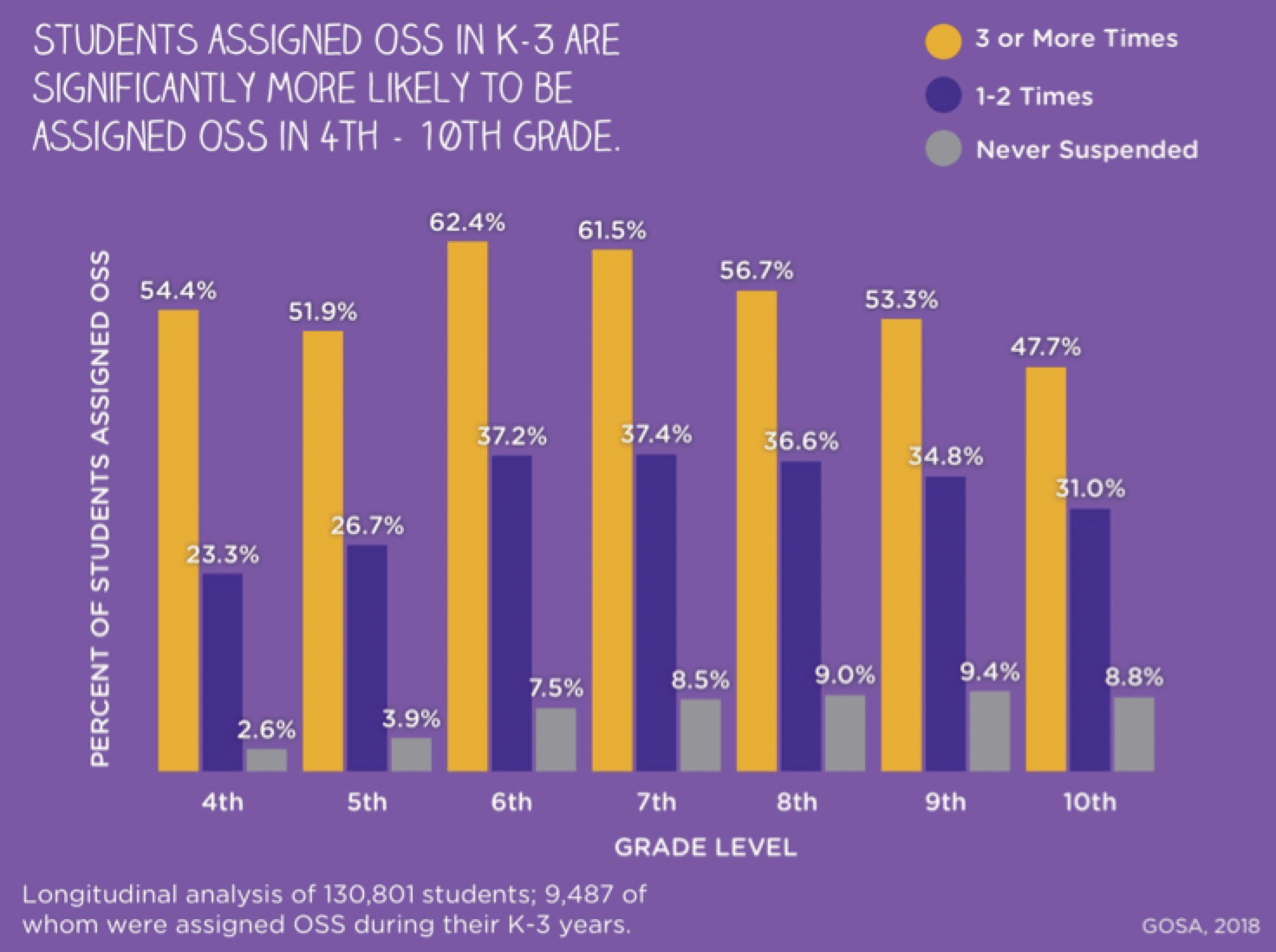GOSA Report Links K – 3 Suspension to Lower Achievement in Reading and Math

By Krystin Dean
The Governor’s Office of Student Achievement (GOSA) recently published a groundbreaking report titled “How Does Early Childhood Suspension Relate to Achievement in Reading and Math?” which indicates that higher counts of K – 3 out-of-school suspensions (OSS) correlate with lower reading/English Language Arts (ELA) and math proficiency in Georgia.
Using data from GA-AWARDS, Georgia’s longitudinal education data system, GOSA examined the relationship between K – 3 OSS and success in reading/ELA and math from third grade through high school. The report also identifies patterns in the incident types that led to K – 3 suspensions, as well as the relationship between K – 3 suspensions and the count of future OSS in middle and early high school.
The more suspensions a student received during K – 3, the worse they performed on reading/ELA and math CRCT and EOC tests—a pattern that held across all race/ethnicity groups, as well as across gender, poverty status, disability status, and English learner (EL) status.
“GOSA is excited to provide data that inform new conversations and approaches to address how early childhood suspension may impact literacy rates and overall student performance in the state of Georgia,” said GOSA Executive Director Cayanna Good.
On average, 15,000 children in grades K – 3 receive OSS each year in Georgia. Of those, 2,600 receive more than five suspensions in a school year. GOSA’s findings indicate that 74.2 percent of the incidents that led to OSS for these young students were coded as “other”—indicating that the majority were minor behaviors.
Students who received higher counts of K – 3 OSS were more likely to receive suspensions during fourth through 10th grade. For example, 54 percent of fourth graders who received more than three OSS in K – 3 were more likely to be suspended in later grades —compared to just 3 percent of peers who weren’t.
“The GOSA study illustrates the need for us to take a second look at the causes and outcomes of behavior issues with our youngest children,” said Georgia Department of Education (GaDOE) Deputy Superintendent of Policy and External Affairs Dr. Garry McGiboney. “The data is an ‘early warning’ that it is essential to identify the skill deficits of children at the earliest ages. The ‘early warning’ approach encouraged by the Get Georgia Reading Campaign was the genesis of this and other studies that are influencing policies.”

The data indicates that OSS has a distinct impact on childhood literacy. Only 14.5 percent of students suspended one or two times were reading proficiently in third grade, compared to 38 percent of students who were never suspended—and only 8.5 percent of third graders suspended three or more times were proficient readers, compared to 44 percent of students who were never suspended.
This impact carried into the seventh grade where only 10 percent of students suspended three or more times while in K – 3 were reading proficiently or higher.
Young students who are expelled or suspended are as much as 10 times more likely to drop out of high school, experience academic failure and grade retention, hold negative school attitudes, and face incarceration than those who are not.
Douglas County Juvenile Court Judge Peggy Walker noted in a lightning talk that, “When children don’t have language, their behavior becomes their language.” The source of challenging behavior that leads to OSS may be communication and language difficulties—skills that can be improved through early assessment and intervention services. Appropriate evaluation and follow-up services are critical, but less likely if the child is expelled from the system.
Language delays are a well-established root cause of reading difficulties. Data from this 2018 Bercow report shows that only 15 percent of kids with identified language deficits achieved expected standards of reading in primary school compared to 61 percent of their peers. The language research also shows that students with language deficits are more likely to be suspended from school.
In an effort to ensure that every child in Georgia is on a pathway to reading proficiency by the end of third grade, the Get Georgia Reading Campaign is focused on identifying and addressing underling factors informed by targeted research—and Georgia partners are taking action.

Through a partnership between the GaDOE, Metro Regional Education Service Agency (RESA), and Bright from the Start: Georgia Department of Early Care and Learning (DECAL), Georgia has been innovating a practice that integrates strategies from the preschool Positive Behavioral Interventions and Supports (PBIS) model into the elementary school-wide model.
A new Early Learning PBIS Specialist, a jointly funded position between DECAL and GaDOE, is tasked with sustaining and scaling this new developmentally appropriate PBIS model in order to strengthen Georgia teachers’ ability to address challenging behavior and create a positive classroom climate for all children.
These partners also recently collaborated to create a PBIS Early Learning Toolkit that helps build the capacity of educators to structure positive learning environments that prevent challenging behaviors from occurring and set the stage for social-emotional learning. To reinforce these supports, DECAL and GaDOE co-sponsor webinars on early learning climate for the early grades.
Get Georgia Reading Campaign partners also promote the SEE-KS framework which promotes instructional strategies that foster increased student engagement in the classroom and allows for a wide range of options for student action and expression, including children who are beginning to use language and those who are not yet conversational.
HB 740, which became effective on July 1, prohibits students in preschool through third grade from being suspended from school for more than five days without first receiving a multi-tiered system of supports, a framework for identifying and addressing students’ academic and behavioral needs. The bill was co-sponsored by Rep. Randy Nix and Rep. Henry “Wayne” Howard.
“Thanks to the Get Georgia Reading Campaign, we now have the data to drive necessary reforms to address issues like early childhood suspensions,” said Rep. Nix. “Their advocacy for early interventions is invaluable in the policy-making process. I’m convinced that greater focus on issues impacting early literacy will create positive impacts on student achievement at all levels—elementary, middle, and high school.”
Combined efforts encompassing data analysis, policy change, and resources are aimed at helping educators identify kids with language deficits and providing access to supports and services to help address these deficits earlier—which will ultimately lead to reducing behavior problems and increasing third-grade reading proficiency.
“This report reveals that kids who get suspended in kindergarten through third grade are far more likely to be suspended again all the way into high school,” said Howard. “Getting ahead of that now by providing the resources necessary that support students’ academic and behavioral needs—from providing hearing screenings to mental health counseling—will help us plug up the school-to-prison pipeline.”
Download the full report.
Download the GOSA report’s infographic.
